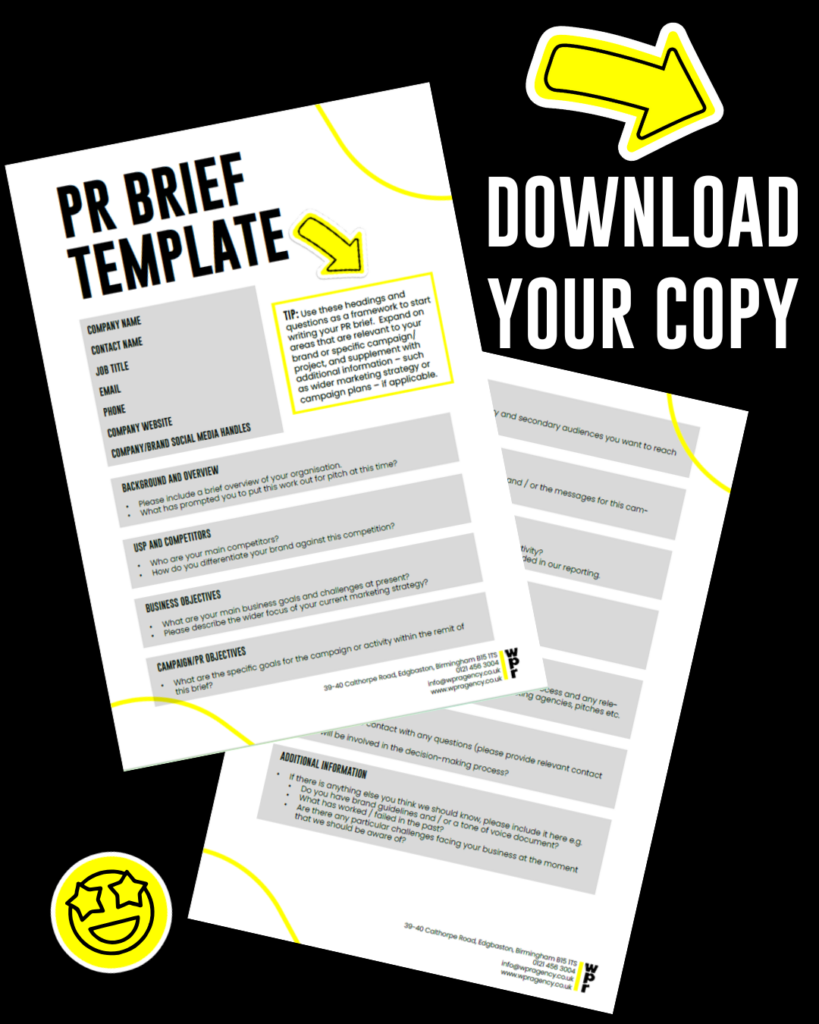How to Write a Great PR Brief & Example PR Brief Template
After more than 25 years working in PR, I’ve seen countless examples of every type of PR brief, from the sublime to the ridiculous.
For anyone who thrives on creative marketing challenges, the sense of anticipation that comes with a new brief landing in your inbox never goes away. But the quality of that PR brief can have a significant impact on how effective the subsequent strategy or campaign will be.
Here are a few pointers about why getting a PR brief right matters, what you should be including and, to make life even easier, we’ve included an example PR brief template that you can download at the end of the blog.
Why A Great PR BRief Matters
We love it when our clients say they see us as an extension of their team and, when we receive a brief from a new potential client, that’s always the end goal we have in sight. The proposal and pitching stage will be – we hope – the start of a brilliant creative partnership.
It’s no surprise that we’re passionate advocates of the value PR can add to a business, but we recognise that marketing teams face countless competing demands for time, budget and attention. So, if you’re planning to invest in PR as part of your marketing mix, you’ll reap the benefits of starting the process with a PR brief that allows the PR agency to do its best work from the outset.
The more we can learn about what makes your brand tick, the challenges you’re dealing with as a marketing team and wider business, and what you really need from your PR agency, the more tailored and targeted our strategy and ideas can be.
Eight Essentials for PR BRief
1. Background and Overview
Any PR agency you’re inviting to write a proposal will do its own research, but it’s helpful to hear about your business, brand, products or services in your own words.
Also, some context of why you’re writing the brief at this time – whether it’s influenced by market conditions, the end of an existing agency contract, or a new strategy – can be useful too, as can information about the scope of the work that is out for tender.
2. USP And Competitors
What sets your brand apart, who do you consider your key competitors and how do you differentiate your brand from theirs? If you have a SWOT analysis or a summary of the strengths and weaknesses of your brand, that can be extremely helpful.
3. Objectives and Goals
What are your business objectives and wider marketing objectives? How does this relate to what you want to achieve with this activity specifically? Whether you want to raise brand awareness through earned media or launch a new product, we need to understand what you want this campaign to focus on, where it fits into the bigger picture for your brand, and any work that is ongoing outside the remit of the brief. We don’t always need to see your full marketing strategy or plan (although that would often be helpful) but we do need to know where PR fits into your wider activity so that all goals are aligned. If you can include specific KPIs, that’s even better.
4. Audiences
Who are your primary audiences? Are you aspiring to reach new audiences outside your existing customer base? Have you devised buyer personas or do you have any customer research you can share?
5. Key Messages
What do you want your audiences to take away from the content they see about your brand? How do you want your brand to be perceived and is there currently a disconnect between those messages and how audiences think
6. Evaluation
What will success look like to you? Do you have specific KPIs that you want us to report on? What do you need to share with your wider business in terms of evaluating the results of any PR activity?
7. Budget
It doesn’t need to be an exact amount, a budget range is ideal, but we do need a financial indicator. There’s simply no point in us creating a brilliant campaign idea that’s financially unachievable for you. Part of our skill is to devise the best possible strategy and ideas that can be delivered within the resources you have; we can only do that if we know (roughly) what budget we’re working with.
8. Timescales and Process
Clarity about deadlines for each stage of your procurement process can be really helpful, from when you want initial creds or chemistry meetings, to when proposals should be submitted, and when you want work to begin.
While PR people thrive on the fast pace of our industry, and are more than capable of working to a tight deadline when they need to, the proposal and pitch writing phase is not the best time to test that ability! Try to allow at least two weeks from supplying the brief to the proposal deadline. You’re making a big decision about where to invest your budget and trust, so it makes sense that you’d want to be armed with the best possible information to evaluate which agency is right for you. You’ll only get that when time is built into the process for the PR consultancies responding to give your brief the time and consideration it deserves.
And FInally…
The list above is far from exhaustive but it gives you a PR brief template from which to start. The specifics will vary from brief to brief, for example, the level of detail needed for a full-service retainer will be different from what is needed for a smaller, one-off project.
From insight to your brand tone of voice to information about key spokespeople available for media work, challenges you’ve faced in the past to pet hates in PR campaigns, the more we can get under the skin of your brand, product or service, the more fully we can respond to your requirements.
Put simply, we’re big believers in transparency and communication and want the businesses we work with to be honest and open with us. If you’re clear about what you want from your PR agency, we can apply our expertise and creativity to devising ideas that get the world talking about your business.
The author: Jane Ainsworth is managing director of WPR. She has over 20 years’ experience in developing and delivering communications strategies for consumer brands including Dunelm, Tesco, Mothercare, Greene King, John Lewis, Bullring, Beaverbrooks and Westfield.


WPR is an award-winning PR agency, based in Birmingham, renowned for getting the world talking about the brilliant brands we work with. We specialise in consumer PR, across sectors including food and drink, retail and leisure; B2B PR, where we work with companies spanning manufacturing, construction and HVAC industries; and social media.
To start a conversation about how we can get the world talking about your business, please get in touch – we’d love to chat.
